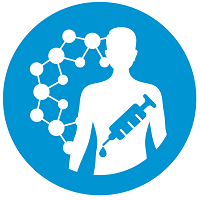Preclinical, Clinical and Translational Sciences
Recent Developments, Opportunities and Translational PKPD Aspects of Next Generation Antibody-Drug Conjugate (ADC) Therapies
Tuesday, October 22, 2024
2:30 PM - 3:00 PM MT
Location: 250 ABC

Douglas Leipold, Master of Science (he/him/his)
Director of PK Technology/Operations
Genentech
South San Francisco, California
Hot Topic Speaker(s)
Over the past few years, there have been major advances in the cancer therapeutic landscape with the development of novel protein therapeutics. A deeper understanding of biological mechanisms and diversification of antigen targets, coupled with the advent of newer engineering approaches has paved the way for development of next-generation cancer therapies such as newer immune checkpoint inhibitors, engineered cytokines and cytokine mimetics, T cell engaging bispecifics, co-stimulatory molecules, antibody-drug conjugates (ADC), and cell therapies. However, the field still faces several challenges to develop cancer therapies that are consistently efficacious in a majority of patients and cancer types. A few key challenges include safety concerns resulting in narrow therapeutic index, sub-optimal activity, overcoming treatment resistance, selection of appropriate patient population, optimizing dose and dosing schedule. Of late, there has been a rise in the development of a new generation of cancer therapies to tackle these issues and show promise to treat cancers in a more effective and safe manner. A variety of engineering approaches are being utilized to improve efficacy and tolerability (e.g., tumor targeting arms, multi-specific molecules, conditional tumor-activated moieties) while maintaining the developability characteristics (e.g., half-life extension using Fc-fusions and PEGylated moieties) of newer therapies in oncology. As complex engineering approaches are utilized in discovery and development, it is essential to have a mechanistic understanding of how these alterations impact pharmacology, PK/PD and safety profile of novel anti-cancer therapeutics. Such an understanding is critical to guide lead candidate selection, provide translational insights, allow optimization of dosing strategies, aid patient selection strategies as well as inform potential combination partners in the clinical setting. This symposium will focus on preclinical, translational and clinical pharmacology efforts related to development of novel anti-cancer therapies including characterization of intricate PK-PD relationships in preclinical/clinical setting and development of in-silico models to understand preclinical data or to inform design of clinical trials.
Learning Objectives:
- Upon completion, participants will be able to describe translational pharmacology/PK-PD aspects as well as challenges and considerations in development of large-molecule anti-cancer therapies by learning from real-world case studies
- Upon completion, participants will be able to describe and learn state-of-the-art modeling and simulation strategies in translational drug development of newer anti-cancer therapeutics
- Upon completion, participants will be able to demonstrate appreciation of regulatory authority requirements for a new IND/CTA submission and recommendations for design of First-in-Human (FiH) trials testing novel anti-cancer therapies


